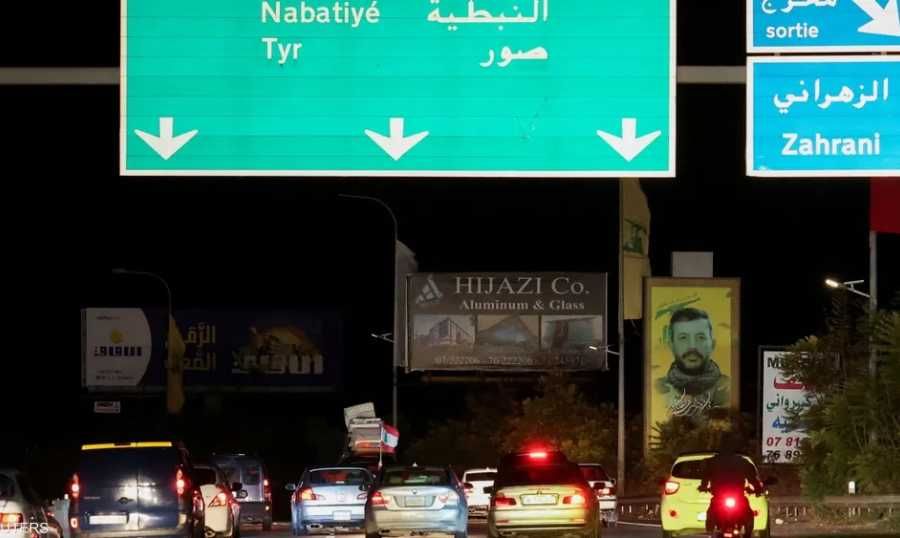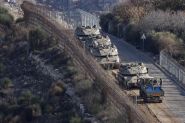
The ceasefire between Israel and Hezbollah took effect at dawn on Wednesday after a night of extreme violence.
In the city of Beirut, hit by bombardments and calls to evacuate, panicked residents “took refuge” in “safe” areas, while some spent the night in the open air in a desolate spectacle showing the result of Hezbollah and Iran's policy on Lebanon.
The ceasefire began at 4 AM and gunfire could be heard in many Lebanese regions in celebration despite the presence of drones in the sky. An hour after the ceasefire began, the characteristic hum of Israeli surveillance drones could still be heard.
For now, the persistence of the drones could be seen as yet another Israeli show of force to see who has the last word.
Israel Asks Southerners to Refrain From Returning Home
For its part, the Israeli army issued an appeal through its Arabic-speaking spokesman, Avichay Adraee, warning the inhabitants of southern Lebanon not to return home just yet, as the region was not safe.
Adraee also said that the Israeli army would notify southern residents of the appropriate time, adding that the army would remain deployed in the south in accordance with the ceasefire clauses.
In a message posted on X, Avichay Adraee told Lebanese residents that they are “forbidden to head towards villages that the Israeli army has ordered to be evacuated or towards Israeli army forces present in the area.”
“For your own safety and that of your family members, you must refrain from going to the area. We will inform you when it is safe to return home,” he adds.
He added that the Israeli armed forces remained deployed inside southern Lebanon.
The Lebanese Army Issues Safety Directives
In addition, the Lebanese army (LAF) command reported on Wednesday morning that “as the ceasefire comes into effect, the Army is taking the necessary measures to complete the deployment in the south as mandated by the Lebanese government and to carry out its missions in coordination with the United Nations Interim Force in Lebanon – UNIFIL within the framework of Resolution 1701.”
The Army Command also called on citizens to wait to return to the frontline villages and towns until Israeli forces withdraw in accordance with the ceasefire agreement. The army emphasized the importance of adhering to the directives of the military units deployed in the area in order to preserve their safety. The LAF also called on people returning to the other areas to be cautious of unexploded ordnance and suspicious objects left behind by the Israeli enemy and to contact the Army Command's operations room on 117 to report them or to report them to the nearest Army center or other security forces.”
Lebanese army units have not yet deployed to the border towns, pending the government's decision and approval of the deployment plan prepared by the army command.
Southerners Return Home
However, civilians have taken the lead, arriving in the south ahead of the army and UNIFIL since the early hours of dawn.
Cars carrying people displaced from southern Lebanon by Israeli strikes in recent months were seen heading south after the start of the ceasefire between Israel and Hezbollah. Despite warnings, dozens of vehicles headed towards Saida, while photos on social networks show cars piled high with mattresses and other belongings.
Some local media also reported that the concrete barricades installed at the entrances to Beirut's southern suburbs were being removed.
All this, despite the fact that Hezbollah has yet to formally recognize the ceasefire.
A Difficult Night
On Tuesday night, a barrage of missiles hit Beirut's southern suburbs, as well as other areas of the capital, including Saida, Tyre and Naqoura in the south, Hauch, Maarakeh, Hounin, as well as Riyak, Nabi Shit and Janta in the Bekaa.
The raids targeted Hezbollah positions as well as buildings housing branches of Qard al-Hassan.
The Israeli army also blew up houses in Khiam, in the Marjayoun caza, as part of their gradual retreat.
Isolating Lebanon From Syria
The intensity of the last few hours was also reflected in Israel's determination to isolate Lebanon from Syria, or more precisely to prevent weapon smuggling between Syria and Lebanon. After bombing the eastern and northeastern borders in previous weeks, the Israeli air force targeted all the bridges at the crossing points between the two countries in northern Lebanon (Wadi Khaled, Arida and Abboudiyeh, Dabbousseh). Injuries were reported at the General Security center in Arida.
The Israeli army used 10 fighter jets to carry out the raids on Akkar.



Comments